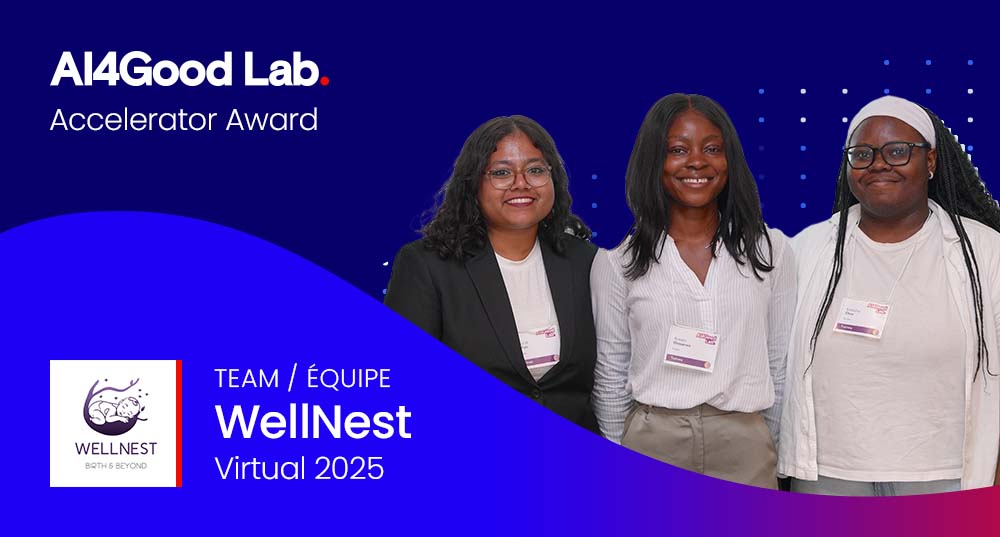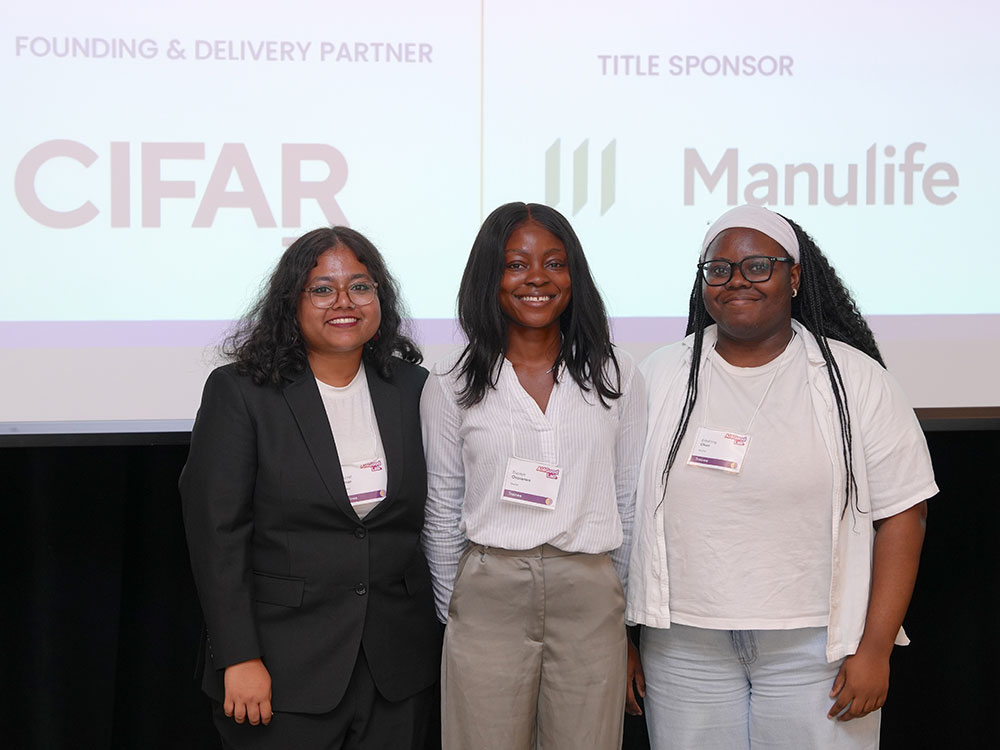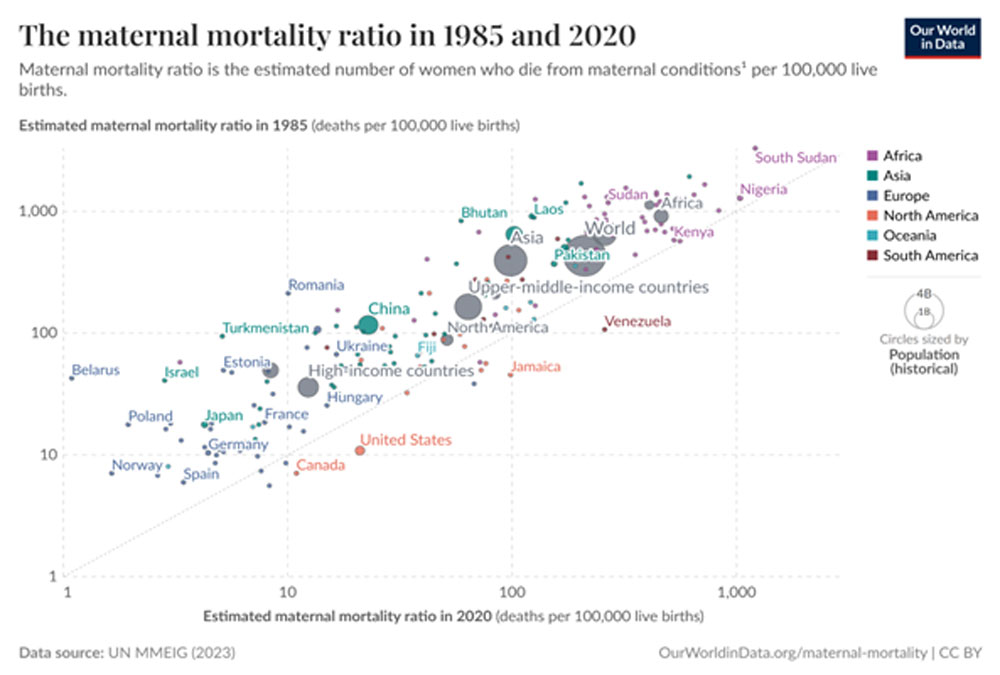
Team members
Busayo Ososanwo, Edidiong Okon, Nusrat Jahan, Saja AbuFarha, Yuechun (Esther) Wei
Project summary
WellNest is a digital perinatal wellness companion that unifies predictive health screening, mental health support, and culturally tailored care in one intelligent platform.
Keywords
Maternal health, postpartum depression, perinatal care, predictive health screening, AI4Good, femtech, cross-cultural healthcare, wellness companion, digital health equity
Website

Introduction and Project Background
Every day, more than 700 women die from preventable pregnancy and childbirth-related causes. That equates to one life lost every two minutes. In addition, nearly one in ten women experiences postpartum depression, with some studies reporting as many as one in seven. These statistics highlight persistent and systemic failures in maternal care worldwide.

In Canada and across the globe, racialized, immigrant, and low-income communities face disproportionate risks due to undetected complications, delayed diagnoses, and overlooked mental health needs. Too often, physical and emotional health are treated separately, partners are excluded, and medical records remain fragmented.
Our team’s personal experiences underscored the urgency of this issue. One member lost a family member to a missed complication, while another endured a near-fatal childbirth event. These tragedies were preventable. What was missing was a system that could anticipate risk, provide emotional support, and remain with families throughout their journey.
WellNest was created to address that gap.
List of technologies
- Machine Learning Models: LightGBM, Random Forest, and Decision Trees for physical health risk classification (achieving 87.5% accuracy).
- Mental Health Screening: EPDS-based (10-question Edinburgh Postnatal Depression Scale).
- LoRA-Tuned Chatbot: Fine-tuned on Phi-2 (2.6M parameters) to serve as a virtual doula for empathetic and safe conversations.
- Upcoming Integrations: Curated community engine, partner dashboards, multilingual wellness library, integration with medical-grade at-home testing devices.
Core Features
- Physical Health Risk Detection: Classifies risk (low, medium, high) using vital signs.
- Mental Health Screening: Identifies emotional well-being concerns and suggests next steps.
- Virtual Doula Chatbot: Provides empathetic support while flagging high-risk language.
- Community and Care Dashboards (in progress): Offers tailored resources for users, partners, and providers.
- Cross-Border Medical Records: Portable, user-controlled, and secure sharing.
Unlike existing apps that simply log symptoms, WellNest is proactive and holistic, adapting to each user’s stage and cultural context, which ensures personalized support.
Project development
Design First: Building Calm, Trust, and Accessibility
We began with design because perinatal care is deeply emotional and personal. Parents need more than features. They need insight, clarity, and reassurance.
- Branding and Visuals: Using Canva, we developed prototypes centered on purple and pastel green. Purple conveys calm and safety, while green represents growth and recovery.
- User Experience: Flows were kept concise, and we used progressive disclosure, presenting information step by step so users never feel overwhelmed.
- Accessibility: High-contrast text and generous touch targets were prioritized from the start.
- Tone: From the chatbot interactions to dashboards, language is supportive and doula-informed, avoiding clinical jargon.
By leading with design, we ensured WellNest feels like a companion.
Technical Stack and Rationale
- Frontend: Lovable.dev, chosen for speed and flexibility under the lab’s time constraints without sacrificing polish.
- Data and Authentication: Supabase, providing a secure Postgres foundation with built-in authentication and row-level security.
- Machine Learning and Safety: Ensemble models for physical health risk detection, EPDS for mental health screening, and a LoRA-tuned Phi-2 assistant equipped with safety triggers and escalation logic.
Development Approach
- Machine Learning: Ensemble models validated on diverse vital sign datasets.
- Mental Health Integration: EPDS-based screening with real-time recommendations.
- Chatbot Design: LoRA-tuned with safety triggers and escalation pathways.
- Ethical AI Principles: Data transparency, user consent, and bias mitigation integrated at every stage.
This project represents a strong machine learning use case because maternal health data is fragmented and underutilized. Predictive analytics, combined with inclusive design, allows for timely interventions and potentially life-saving outcomes.
Impact/Innovation
Addressing Critical Gaps
WellNest addresses three critical gaps: early detection, emotional support, and continuity of care.
Why We Are Different
- Predictive: Anticipates risks through machine learning rather than simply tracking symptoms.
- Inclusive: Culturally sensitive and globally adaptable.
- Partner-Ready: Provides dashboards for caregivers and families.
- Ethical: Places users in control of their data through consent-driven practices.
While other apps like Flo and Ovia focus on milestone tracking, WellNest redefines perinatal technology by integrating predictive health, emotional well-being, and cultural personalization in one platform.
Potential Impact
- Reduce maternal morbidity and mortality through earlier interventions.
- Improve postpartum mental health outcomes.
- Advance health equity in marginalized communities.
- Contribute anonymized, consented data to global maternal health research (with consent).
Challenges
- Fragmented Health Records: Designed for secure, cross-border portability.
- Bias in Predictive Models: Continuous dataset validation with input from diverse advisors.
- Lack of Diverse Mental Health Datasets: Utilized the EPDS questionnaire for mental health screening.
What we learned and accomplished
- AI4Good Experience: We deepened our commitment to ethical, socially impactful AI development.
- Project Development Process: We learned that user-centered design is not optional but essential when addressing deeply personal health needs.
- Accomplishments: Building a functioning MVP with 87.5% risk classification accuracy and developing a chatbot fine-tuned to provide safe emotional support.
What’s next for the project
- Short Term (Fall 2025): Finalize chatbot accuracy, add dashboards, localize for multilingual and offline use, and refine community engine.
- Long Term (2026): Launch closed beta in Canada, starting with underserved communities and partnerships with doulas and clinics for validation.
Acknowledgements & References
We acknowledge the support of the AI4Good Lab, which provided the foundation for this project. We are deeply grateful to our TA, Andjela Mladenovic, and our mentor, Elnaz Davoodi, whose insight and expertise guided us throughout the development of this project. We would also like to thank the coordinators of this lab for this opportunity and for an amazing summer!
WellNest is more than an app. It exists to bridge gaps in maternal care and to ensure that no one feels unseen, unsupported, or unsafe during one of the most critical journeys of their lives.